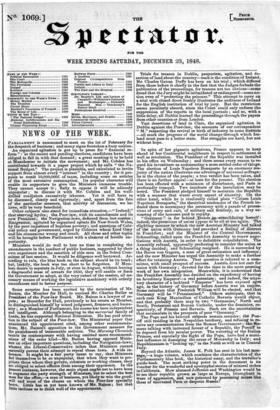Some surprise has been excited by the nomination of Mr.
Baines, the Member for Hull, to succeed Mr. Charles Buller as President of the Puor-law Board. Mr. Baines is a lawyer of re- pute; as Recorder for Hull, previously to his return as Member, he distinguished himself by sound judgment, firmness, and huma- nity ; as a Member of Parliament, his course has been independent and intelligent. Although belonging to the mercurial family of Leeds, be has supported National Education. He has paid atten- tion to the subject of the Poor-law, The Ministerial paper that announced the appointment cited, among other recommenda- tions, Mr. Baines's opposition to the Government measure for the punishment of treasonable sedition. The Morning Chronicle taunts its contemporary with having omitted more recommend- ations of the same kind—Mr. Baines having opposed Minis- ters on other important questions, including the Navigation-laws; whence the Liberal-Conservative infers that Ministers cannot earnestly pursue their attempt to repeal those laws. A wide in- ference. It might be a fair party taunt to say, that Ministers feel themselves to be so unpopular, that when they want to pro- pitiate those whom they govern, colonists or working classes, they are obliged to select officers from among their opponents. In the present instance, however, the main object ought not to have been to augment the party strength of Ministers, but to select the best man for the office,—a man of business, yet likely to win the good- will and trust of the classes on whom the Poor-law specially hears. Little has as yet been known of Mr. Baines ; but that little inclines us to think well of the appointment.
Trials for treason in Dublin, pauperism, agitation, and de- sertion of land about the country—such is the condition of Ireland. Mr. Charles Gavan Duffy has been on his trial ; which differed from those before it chiefly in the fact that the Judges forbade the publication of the proceedings, for reasons not too obvious—some dread that the Jury might be intimidated or endangered—some no- tion even of " protecting the prisoner." This attempt to carry on a trial with closed doors freshly illustrates the unfitness of Ireland for the English institution of trial by jury. But the restriction seems peculiarly absurd, since the Court could only enforce the suppression of the reports in the local journals ; and so, with a little delay, all Dublin learned the proceedings through the papers from other counties or from London.
Vast desertions of land in Clare, the organized agitation in Dublin against the Poor-law, the accounts of our correspondent " M." respecting the revival or birth of industry in some districts —all mark the progress of the social change through which Ire- land must pass to a better state. Her struggles are hard, but not without hope.


























